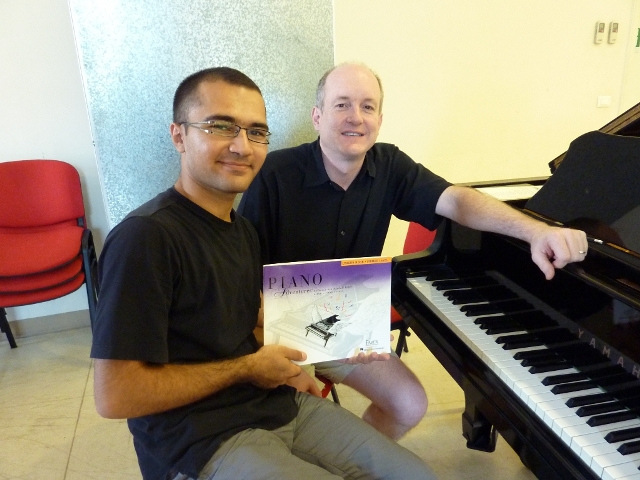Piano Prof Goes to Iraq, Syria and Lebanon to Aid Potential Teachers

Dr. Bradley Bolen with Omar, as he graduates from his first book of piano lessons.
Follow us on Twitter:@BaylorUMediaCom
When nations emerge from conflict or isolation, it seems unlikely that classical music, jazz, Broadway tunes and break dancing would be on most citizens' minds.
But American Voices -- the United States' foremost nonprofit organization for cultural engagement worldwide -- has shown otherwise, in part with its Youth in Excellence on Stage (YES) program. Hundreds of musicians from more than 100 nations have taken part with YES, with millions of people turning out to hear music and see dancing of all genres.
Dr. Bradley Bolen, a senior lecturer in piano at Baylor University, traveled to Iraq, Syria and Lebanon to join a dozen other professional musicians as seminar leaders for six weeks this summer. He found dozens of musicians eager to be his students and seek academic degrees in order to teach, perform and rebuild their countries' educational foundation.
Bolen, who blogged about his experience and posted photos and videos, said one of his most meaningful posts was "A Stroll in the Park," with entries about Boran Zaza, 18, a student at the Institute of Fine Arts at Irbil, Kurdistan, in northern Iraq. She has played piano for only three years, with formal teaching only one of those, but she wants to be the first certified piano teacher in Kurdistan, Bolen said.
Zaza wants to come to America -- possibly to Baylor -- to earn a degree in piano pedagogy. But finances are tight, and she will need American sponsors to help her realize her dream.
"Wouldn't it be neat if her diploma were green and gold?" Bolen said.
Besides offering extensive instruction and encouragement, he donated a suitcase of sheet music to the fine arts libraries of the cities of Mosul and Kirkuk, both in Iraq.
"Since Iraq is a cash-only society, the idea of ordering music - or the idea of music stores at all - is impossible," Bolen said. "When the students said, `Dr. Bolen, don't you realize that this music will be stolen from the libraries after only one week?', my response was, `if the people that steal it will use it, that is fine with me.' They are desperate."
Along with the joy of finding such students as Zaza, there were sobering times, as when he rode through the hills leading to the outskirts of Beirut.
There, Bolen saw homes and businesses with battle scars from the previous civil war, as well as evidence on ongoing conflicts with Israel.
"Pretty much any building over 15 years old has at least some minor damage -- a constant reminder that nothing can be taken for granted," he said.
Bolen said that his trip "put a personal face on what was otherwise a vague and faraway place and people and given me an even greater resolve that I should, and can, make a difference.
"I look forward to working to facilitate ways for these surprising young talents to receive accreditation so that they can return home to rebuild their country, while at the same time hoping that the arts contribute to a day when they won't have to rebuild at all."
To learn more about Bolen's experiences in Iraq, visit his blog at bolen88.wordpress.com or contact him at (254) 710-7054.
Contact: Terry Goodrich, Assistant Director of Media Communications, (254) 710-3321
or Richard Veit, Concert and Promotions Manager in Baylor's School of Music, 254) 710-3991